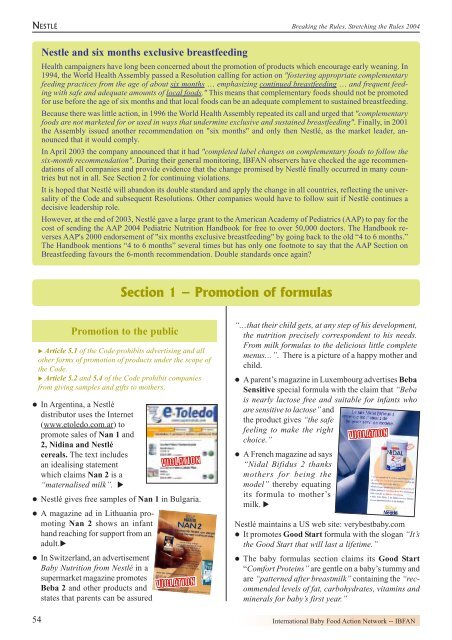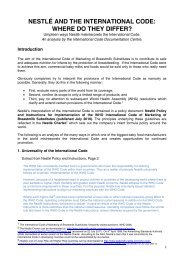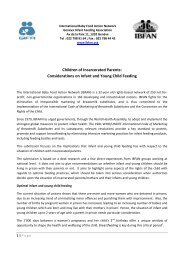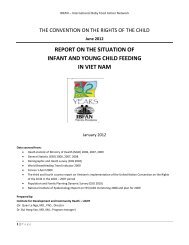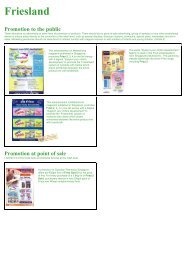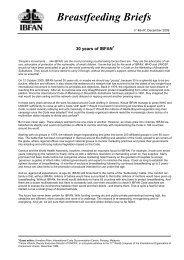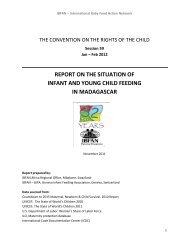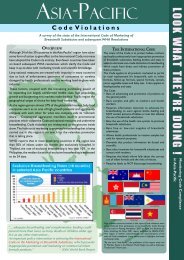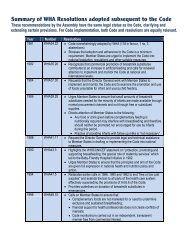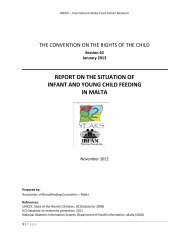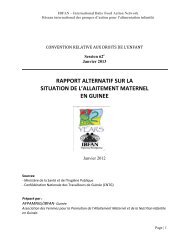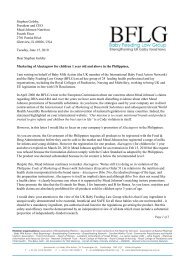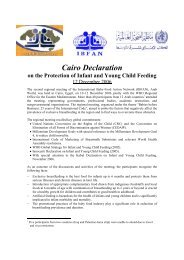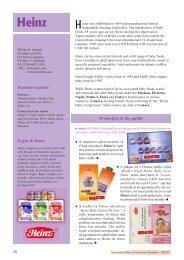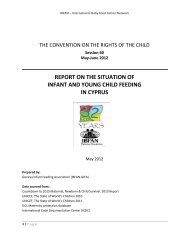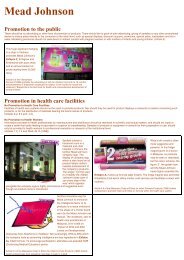Create successful ePaper yourself
Turn your PDF publications into a flip-book with our unique Google optimized e-Paper software.
NESTLÉ<br />
Nestle and six months exclusive breastfeeding<br />
Breaking the Rules, Stretching the Rules 2004<br />
Health campaigners have long been concerned about the promotion of products which encourage early weaning. In<br />
1994, the World Health Assembly passed a Resolution calling for action on "fostering appropriate complementary<br />
feeding practices from the age of about six months … emphasizing continued breastfeeding … and frequent feeding<br />
with safe and adequate amounts of local foods." This means that complementary foods should not be promoted<br />
for use before the age of six months and that local foods can be an adequate complement to sustained breastfeeding.<br />
Because there was little action, in 1996 the World Health Assembly repeated its call and urged that "complementary<br />
foods are not marketed for or used in ways that undermine exclusive and sustained breastfeeding". Finally, in 2001<br />
the Assembly issued another recommendation on "six months" and only then Nestlé, as the market leader, announced<br />
that it would comply.<br />
In April 2003 the company announced that it had "completed label changes on complementary foods to follow the<br />
six-month recommendation". During their general monitoring, <strong>IBFAN</strong> observers have checked the age recommendations<br />
of all companies and provide evidence that the change promised by Nestlé finally occurred in many countries<br />
but not in all. See Section 2 for continuing violations.<br />
It is hoped that Nestlé will abandon its double standard and apply the change in all countries, reflecting the universality<br />
of the Code and subsequent Resolutions. Other companies would have to follow suit if Nestlé continues a<br />
decisive leadership role.<br />
However, at the end of 2003, Nestlé gave a large grant to the American Academy of Pediatrics (AAP) to pay for the<br />
cost of sending the AAP 2004 Pediatric Nutrition Handbook for free to over 50,000 doctors. The Handbook reverses<br />
AAP's 2000 endorsement of "six months exclusive breastfeeding" by going back to the old “4 to 6 months.”<br />
The Handbook mentions “4 to 6 months” several times but has only one footnote to say that the AAP Section on<br />
Breastfeeding favours the 6-month recommendation. Double standards once again?<br />
Section 1 – Promotion of formulas<br />
Promotion to the public<br />
� Article 5.1 of the Code prohibits advertising and all<br />
other forms of promotion of products under the scope of<br />
the Code.<br />
� Article 5.2 and 5.4 of the Code prohibit companies<br />
from giving samples and gifts to mothers.<br />
� In Argentina, a Nestlé<br />
distributor uses the Internet<br />
(www.etoledo.com.ar) to<br />
promote sales of Nan 1 and<br />
2, Nidina and Nestlé<br />
cereals. The text includes<br />
an idealising statement<br />
which claims Nan 2 is a<br />
“maternalised milk”. �<br />
� Nestlé gives free samples of Nan 1 in Bulgaria.<br />
� A magazine ad in Lithuania promoting<br />
Nan 2 shows an infant<br />
hand reaching for support from an<br />
adult.�<br />
� In Switzerland, an advertisement<br />
Baby Nutrition from Nestlé in a<br />
supermarket magazine promotes<br />
Beba 2 and other products and<br />
states that parents can be assured<br />
“…that their child gets, at any step of his development,<br />
the nutrition precisely correspondent to his needs.<br />
From milk formulas to the delicious little complete<br />
menus…”. There is a picture of a happy mother and<br />
child.<br />
� A parent’s magazine in Luxembourg advertises Beba<br />
Sensitive special formula with the claim that “Beba<br />
is nearly lactose free and suitable for infants who<br />
are sensitive to lactose” and<br />
the product gives “the safe<br />
feeling to make the right<br />
choice.”<br />
� A French magazine ad says<br />
“Nidal Bifidus 2 thanks<br />
mothers for being the<br />
model” thereby equating<br />
its formula to mother’s<br />
milk. �<br />
Nestlé maintains a US web site: verybestbaby.com<br />
� It promotes Good Start formula with the slogan “It’s<br />
the Good Start that will last a lifetime.”<br />
� The baby formulas section claims its Good Start<br />
“Comfort Proteins” are gentle on a baby’s tummy and<br />
are “patterned after breastmilk” containing the “recommended<br />
levels of fat, carbohydrates, vitamins and<br />
minerals for baby’s first year.”<br />
54 International Baby Food Action Network -- <strong>IBFAN</strong>


